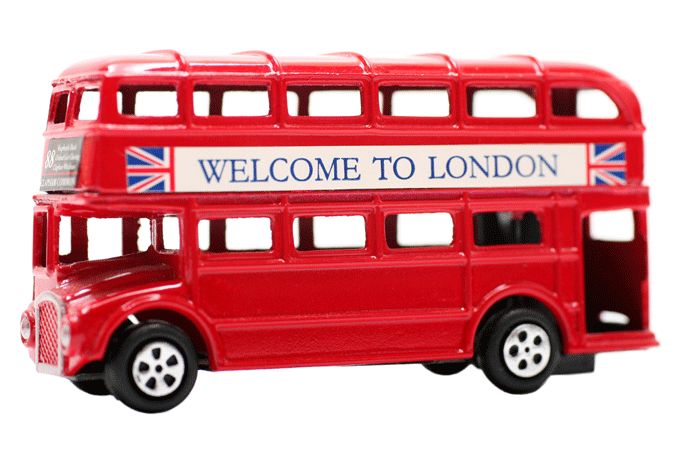It wasn’t long into our relationship when my then-boyfriend, now husband, asked me if I would ever consider living in his native England. While trying to play down my initial “holy crap, this might just be serious” reaction, I immediately answered with a solid yes. Fast forward a few years and a couple of kids later and you couldn’t drag my card-carrying, U.S. citizen husband off American soil. The great weather and excellent job opportunities of the Bay Area had sucked him in for good.
After a cross-country move, and then back again, we planted ourselves in the San Francisco suburbs just in time for our daughter to start school. My husband worked furiously at his career and after giving his all at a couple of lackluster start-ups, he found a job with real potential. When the company started to take off, the business trips to Europe became more and more frequent. It was clear that expansion was in the works, and having a permanent fixture on U.K. soil was part of the company’s plan. Initially, our family spent six weeks over summer vacation in a company-paid flat in London. We were then offered a semi-permanent (and very subsidized) extension. For a girl who grew up in suburban Orange County, this sounded like the best opportunity ever. Ultimately, we said yes. But weeks of discussion, arguments and even some tears made us wonder if we had made the right decision.
There are obvious pros and cons to transplanting your family across an entire ocean. And certainly many questions arose for us: What would we do with our house? Would we find good schools? How would we deal with the culture shock? For us, the uncertainty was outweighed by all the positive opportunities. Here are a few things to consider if you think a move abroad may be in your family’s future.
Is the move feasible? Obviously the most important considerations are money, housing and schools. A bigger company might have had an entire department dedicated to expats, but we had to sort much of the red tape on our own. Because my husband and kids are British citizens, they needed no paperwork. I, on the other hand, needed a visa. Again, because of my husband’s citizenship, I was able to get a visa that allowed me to work if I was so inclined. We also made sure to negotiate everything in writing prior to the move. We were given an allowance for cars and healthcare (employer-paid insurance isn’t common due to the National Health Service). We also made sure we had a repatriation plan and that the company would pay for our return in case of termination.
Our finances in the U.S. were also a major worry. Luckily, we were able to rent out our house in the Bay Area, and because our rent was paid for us in London, we saved quite a bit of money. Our cars were another story. Being away for an extended amount of time presented the problem of what to do with them. My car was barely a year old with a hefty car payment, and while I loved it, it didn’t make sense to keep it. We were also concerned about the tax implications, but my husband managed to secure company-paid tax preparation in both countries for every year that was affected by the move. We were hit pretty hard with the U.K. taxes, but this year we got a sizable refund because we had paid so much the previous year. Luckily our tax guy is a genius!
I can’t stress enough how important it is to think about all these financial aspects upfront. Had my husband not been a keen negotiator, it might have ended badly for us. As a starting point, I’d suggest checking with both the U.S. Embassy website and the consulate of the country you’re considering for specifics on visas and other logistics. Also, talk to your current tax or financial advisor, making sure they feel comfortable handling the paperwork that comes with living abroad. Don’t forget to negotiate and get everything in writing!
Will the move offer unique perks? There are benefits to moving abroad that your family would never otherwise get to experience. When we moved to London, we were suddenly just an hour away from my husband’s family, with whom we had never spent a Christmas. Although my kids had always Skyped with their cousins, getting to know them face to face only became possible when we relocated to England.
Another major upside to our move was the ability to teach our children about diversity—both the cultural and the ethnic kinds. House hunting was a challenge because we had to make a trade-off between the house location and size. Because we wanted to invite friends and family to stay with us in London, we rented a beautiful four-story home in a nice enough area of South London. We were lucky that this house was within walking distance of an amazing elementary school, where our children mingled with students who came from dozens of nations. For probably the only time in their lives, my kids were in the ethnic minority and I couldn’t have been happier. I know now that my children do not see skin color as any sort of barrier. Perhaps their allure as Americans made the transition easier, but they fit in with the other kids almost straight away. And I have to say that wearing “Harry Potter-esque” uniforms made them eager to get ready for school every morning.
What kind of cultural experiences will you have? Living in the U.K. also meant we could share our love of travel with our kids. As a child, my family and I didn’t venture outside the country at all, but I made it up for it in my early-adult years before I met my husband. And because our children had previously visited England and other parts of Europe, we used the plentiful school holidays to see even more of the world. Every excursion was an opportunity to learn about a new culture, and the kids soaked it up. The best trips were those that offered something for adults as well as kids. In Prague, we spent an afternoon in a beer hall (yes, children are welcome) and visiting a zoo. We ate many typical Eastern European foods and let the kids try a delicious pastry known as trdelnik. On another trip we went to San Sebastian, Spain. This northern coastal town, which is home to more Michelin-starred restaurants per square meter than any other city in the world, felt like a fairy tale for me. For three days, we made our way around the narrow, cobblestone streets sampling pinxtos (small bites of food, similar to tapas) washed down with inexpensive wine. Our adventurous eater tried and loved squid, while the conservative child was not shy about consuming all the spicy chorizo he could get his hands on. These were not experiences our kids could have had back home.
Will you forge memories for a lifetime? Perhaps my favorite excursion was the one I made with just the kids to Paris. The train ride alone was such a treat, particularly when we passed under the Channel Tunnel. We had three days in each city and we made the most of them. While I would have preferred a neighborhood bistro, one night’s dinner in Paris was Nutella crepes. I wanted this to be the Paris of the kids’ dreams, not mine. We strolled through different neighborhoods, once stumbling upon a neighborhood flea market where we examined different antiques and plotted how to get an old school desk into our suitcase.
When we moved on to Amsterdam, I was so happy to teach the kids about their Dutch heritage (my mother was born in Holland). They were fascinated by the canals, and I loved ogling the architecture. We visited big parks, ate fries topped with mayonnaise, and on a serious note, visited the Anne Frank house. Focusing on the kids and not having a huge itinerary meant we could really enjoy ourselves. And it was wonderful to see the excitement in their eyes, even if it was just the joy of getting to ride a new mode of public transportation.
When the time came for us to move back, I have to admit I was happy to be going home. But I wouldn’t have traded our time away for anything. If you ever have the opportunity to make a similar move, consider taking the plunge. Do your research, speak to friends with firsthand experience and if it’s right for you, make the most of it. You won’t regret it.





















2014/05/30 at 3:16 pm
What an interesting and informative article! Always wanted to live abroad. Thanks for the information.